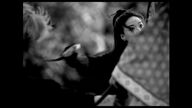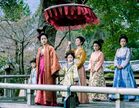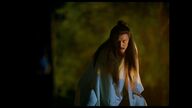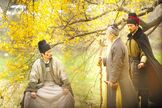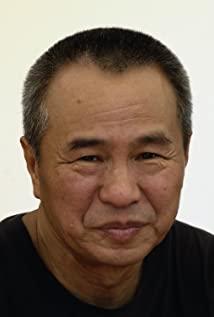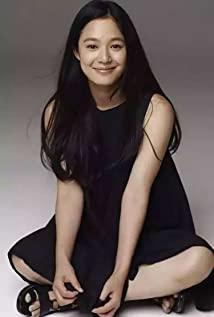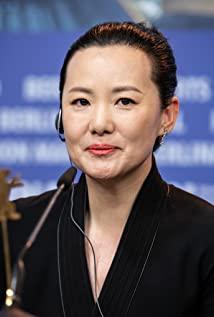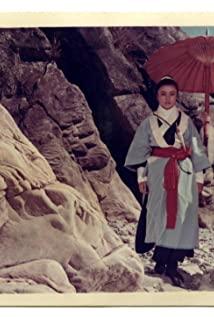It was still the era when the "New Concept" composition contest was popular in colleges and universities across the country. As the base camp for "New Concept", "Grender" at that time was like the "red treasure book" of a young literary general. Sex speaks for itself. It was in this magazine that I saw an introduction to art film by Ren Xiaowen when I was in college, so I knew it for the first time and remembered one name firmly: Hou Hsiao-hsien.
Speaking of which, at that time, my movie viewing stage was really low, and all the movie reserves were nothing more than the Hong Kong movies and a few Hollywood blockbusters that could be seen in the local TV stations and video halls at that time. However, due to the consciousness of a young literary man, although he started late, he should not start too low, so he went straight to the literary and artistic niche in his taste, and was very thirsty for knowledge. There is a large-scale video rental shop at the back door of our school. Since then, I have been in and out of it frequently. I have rented "Farewell My Concubine", "Bath", "City of Glass", "Gua Sha", "Subway to Spring", "Huayan", "Farewell My Concubine", and "City of Glass". "Beijing Joy and Anger"... Some of them fell in love at first sight, such as "Diet Men and Women" and "Raise the Red Lantern", and some felt worse, such as "Breakthrough", of course, the most unbearable and even wanted The one who scolds the mother is none other than "City of Sadness". I watched a pirated disc. The picture was blurry and the color tone was dull. After watching the film, I was not sure whether the mute was Tony Leung. What makes people even more popular is that he has endured the torment tragically and solemnly, insisting on seeing the music at the end of the film, but still at a loss as to what it is about.
Afterwards, I rightly set the man aside, and for a time smugly relished the clarity of decision. Until one day, I read A Cheng's "Let's Talk About Hou Hsiao-Hsien". At that time, my aesthetic concept was already paranoid enough, that is, I no longer believed in the mainstream of the public, and only trusted in the individual tastes I admired. Acheng's "Three Kings" series, I like it very much, so I love Wu and Wu, and I am also devoted to its author. Look at Acheng's remarks: "A hozen popped out of the stone, and Hou Hsiao-hsien appeared in Taiwan." This is not complimenting people, it is clearly creating a god. How could he be so bored with someone he loves so much, it doesn't make sense. With the wonder and humility of "even though I can't reach it, my heart yearns for it", I forced myself to watch "Dongdong's Holiday" again. This time, the look and feel is much better than "City of Sadness". For example, I saw accurate control, but the lack of content still affects the fun of watching the movie, so I didn't pursue it.
To truly watch Hou Hsiao-hsien systematically, the time has come to 2012. Before that, I watched films for nearly three consecutive years at an average annual rate of 250. I thought that I finally had some reserves to talk about and roughly touched the boundaries of this industry. At that time, I just finished watching all the audio films of Ozu that I could find on the Internet, and I was waiting to re-target. When it comes to style, I can always see people making a bundled evaluation of Hou Hsiao-hsien and him. Because of this comparison, I was able to enter the world of Hou Hsiao-hsien for the third time.
I watched "The Man from the Wind Cabinet" first, and I took a few thigh shots during the viewing process. How is it so good? Why wasn't it found? I was happy for a while and annoyed for a while. After seeing it, it turned into a sudden relief. It should be accompanied by a tone of voice, probably the word "oh". It turns out that those youth films with fierce animals can be traced back to the source, and the source is here. Hurry up and look down, and then "Childhood Memories", I was taken aback again, if "The Man from the Wind Cabinet" made me see the deja vu related to the repression and restlessness of the youth generation, then "Childhood Memorabilia" was filmed. It reminds me of the deja vu of my hometown, which is deep in my memory. When it comes to the theme, the confusion, sadness, depression and loneliness of young people in "The Man from the Wind Cabinet" is not new. For many writers and directors, it is even a motif for them to indulge in it for a lifetime. Many talented People will choose to start from there, and then stay there forever. But "Once Upon a Time in Childhood" is obviously not like this. It is obviously the director's autobiography, but emotionally, it is automatic and self-pity, and self-love and self-pity have made a clear cut. (Of course, we later learned that all of this was because of a copy of "Autobiography of Congwen" that enlightened Hou Dao.) So perhaps it can be said that Hou's attitude of "looking at life and death with a cold eye" was broken from "The Man from the Wind Cabinet". 's cocoon turned into a butterfly in "Once Upon a Time in Childhood" after only two years. To this day, I still often think of the excitement of watching the film that day, the excitement that is not one of my personal favorites, and the short review I wrote for it that afternoon. The short comments are as follows: really good / pretty good / very good / too fucking good / almost dying.
After "Childhood Memories", I watched "Lian Lian Feng Chen". At the same time, I was still watching the Darney brothers. I especially liked the ending of these two brothers. They always stopped abruptly with a knife in their hands, which reminded me of Yu Hua's short stories. . But if Huashan's swordsmanship has to be divided, I will definitely choose "Love in the Wind and Dust" without hesitation, because other than the equally well-matched "Childhood Memories", I have never seen a better ending than it: A Yuan joined the army for three years , suffered a mutiny and lost his first love. The film tells that he retired from the army and went home. There was no farewell there, and no one here welcomed him. When I got home, I called in the door, but no one answered. It turned out that my mother was taking a nap, and the rest of the people were waiting. He turned to the outdoor farm and met his grandpa who was working. The two exchanged a few words and then talked about the harvest, like two brothers who met every day in the field. What A Yuan was wearing was the oversized shirt that A Yun sewed for him back then. At this time, the clothes finally fit. If you want to be more honest here, tolerance, growth and desolation are all related to human nature, fortune and the state of the world, but Hou Hsiao-hsien did not describe it, he was only responsible for presenting it, watching from a distance.
After that, I devoured all of Hou's works since The Man from the Windbox, and never got tired of giving up. In the end, when I re-watched "The City of Sadness" and looked back with a complete picture, it took me a full ten years to go from initial resistance to Hou Hsiao-hsien to full love.
What is Hou Hsiao-hsien's status in today's film industry? This proposition basically does not need to be verified. There are many old anecdotes and anecdotes that have happened around it. Senior film fans are probably familiar with it. In Cannes alone, there are Abbas and Kusto. The story of Rika and "Dream of Life", the story of Francis Ford Coppola and "Goodbye to the South, the South," the story of Jim Jarmusch calling himself a student at the award ceremony, and the story of Angela taking the initiative to develop a relationship. In Asia, Akira Kurosawa is full of praise for "Dream of Life", and Feng Junhao regards "City of Sadness" as his personal favorite. It is Hirokazu-eda, Jia Zhangke, and Li Cangdong who respect him as spiritual mentors, and it has long been a story in the film industry. , Even the "old man" Xiaobo Jun, who has won the Nobel Prize and has been a Chinese celebrity for 5,000 years, has a rare praise: "His (Hou Hsiao-hsien) caring for people is a kind of closeness. The concrete equality, really putting people in front of the camera.”
What's so good about Hou's works? The long-term lens of its own style, the lyrical strategy of calm and restraint, the unskilled technique of being quiet and distant, the independent vertical and horizontal grammar of Chinese poetry, the transcendent perspective of looking at life and death with a cold eye... Let’s compare a few angles to see if they still look like it Talk deeply. Perhaps from another angle, we can see the clues more from the sound, color, light and shadow of others: In "Kiujiro's Summer", a super-far perspective of Kikujiro's beating is in pursuit of Hanzi's father in "Dongdong's Holiday". Does the scene of the sparrow catcher echo? Can the source of the poem subtitle cards in "The Twenty-Four Cities" and "The Grand Master" be traced back to "The City of Sadness"? In "The Grand Master", the inexplicable intrusion of the "one-line sky" does not seek coherence of cause and effect, and each swaying and blooming, but who is good at this structural technique? Is the contrast of movement and stillness created by the bicycle chase in "Seventeen-Year-Old Bicycle" a tribute to "The Man from the Windbox"? There are a lot of voice-overs at the end of "Never Stop Walking", no matter the sentence pattern or sigh, is it too similar to the last paragraph of A Xiaogu in "Once Upon a Time in Childhood"? As for the farewell of many parents on the bus station to the younger generation, isn't it the same as the behavior of the grandparents in "Dongdong's Holiday"?
According to Hou Hsiao-hsien, his films are "not dramatic, but reflect the activities of people under the laws of nature", so we can see why he always takes the trouble to shoot meals, chase, and trivialities in his shots. , shoot babble. Personally, I even think that after mastering this key, I may really find the key to interpreting his works. In "City of Sadness", the boss of the Lin family takes the third child, who was beaten badly, home from prison. The whole process is switched from outside the house to the inside of the house in just one shot: the boss's men are plotting revenge outside the door, and the elder sister-in-law and the second sister-in-law are busy in the house I was pouring soup and water, the servants went in and out of the basin and poured water, the third daughter-in-law was crying and helpless, the boss kept getting angry and blamed everyone for being too slow, but the father interjected leisurely: Quiet, don't cry, you cry how things are done. All the characters perform their duties, and they are in their own place, and they are appropriate and accurate. The whole scene is busy but not chaotic, there is stillness in the hustle and bustle, and it is very thorough.
But don't underestimate such an understatement. Without the keen capture and precision refinement of daily life, ordinary people can't take pictures. This is probably the most difficult thing about Hou Hsiao-hsien to learn. To put it more seriously, perhaps only with him can Chinese films truly capture the long-lost reality in our memory. Before that, many so-called truths were just some kind of wishful thinking and even obscenity. How to understand? For example, when we wrote the essay "An Unforgettable Event" when we were young, it was obviously an all-encompassing theme, but when we actually wrote it, everyone would just "learn from Lei Feng" in the same way, either helping the grandma to cross the road, or picking up money and handing it to the police uncle. , or help the old uncle to push the scooter up the steep slope, and even look back when he grows up, the consequences are far from "stop increasing the laughing ears", because once the concept is deeply ingrained, the truth often becomes blurred or even deviates. A lie told a hundred times becomes the truth. The group of junior high school students in the Cultural Revolution in A Cheng's "King of Children", without exception, can only write "red flags are flying, war drums are shaking the sky", but in fact, rural children have never seen a few red flags at all, let alone listen to them. The drums of war. If you have to use your own language to write about personal experiences, it is difficult to even keep a running account. Looking at the current generation after generation, why is it not taught by teachers like this? It is better to make up nonsense than to record it as a running account. So I had to copy the model essay, for fear that it would be plain and not violent, and I desperately gritted my teeth and became ruthless. For the so-called "art is higher than life", he simply broke away from life completely. To give a simple example, there are often episodes of beginners smoking in movies and TV dramas. Anyone who has smoked should have experience. If you don't inhale the tobacco leaves into your lungs, how likely is it for beginners to cough violently after a shallow puff? But in our film and television works, it seems that if we do not choke into a tuberculosis ghost, we go against objective experience. No one knows, how such a nonsense conclusion has been regarded as a golden rule and become popular.
Let’s take a look at Hou Hsiao-hsien again and see how he shoots street fights: a group of people chase after me, sweating profusely, passers-by around them either carry baskets and continue walking, or walk up to throw garbage in front of them, but turn a blind eye. Or turn a deaf ear; ("The Man from the Wind Cabinet") It was so loud that the people sitting on the stools and chairs were so shocked that they got up a little and watched the changes, and when the sound passed, they immediately returned to their sitting positions and returned to normal; ("People from the Wind Cabinet") Childhood Memories") The caller didn't run away, and he didn't put down the hand holding the microphone. He just kept his eyes fixed on the direction of the fight between the two of them, tense his nerves, and his body unconsciously moved forward. Let later. ("The City of Sadness") Another example is the unsmiling grandfather who suddenly nagged at the end of the film, as if he was talking to his young nephew, but also talking to himself, talking about the big truth of being a man. ("Holiday in Winter") These unreasonable scenes, compared with people's habitual thinking, are they true or false? Entering the real from the seemingly unreal incision, and then making people reflect on the real itself, this is probably what the old man calls "really put people in front of the camera and shoot".
Finally, we were looking forward to "Nie Yinniang" at the cinema. What kind of movie is this?
In the entire film market, it is certainly not the mainstream, but in Hou Hsiao-hsien's system, it is actually not abrupt, nor does it matter as a creative breakthrough. In terms of genre, it can't even be called a martial arts movie. It is not killing, and it is for "the world". Although it is the same principle as "Hero", compared with Zhang Yimou, reasoning is obviously not its. center of gravity. So one subject, two shooting methods really vary from person to person. For Hou Dao, I guess the original novel Tang Chuan attracted him most because of the "hidden" character in the name.
It is true that lyrical expressions with a cold-eyed attitude and realistic texts have always been part of Hou's style, which determines that he has always maintained vigilance against drama in the polishing of the script, but weakening the plot does not mean that details cannot be rendered. On the contrary, the vividness of details has always been a highlight of Hou Hsiao-hsien's early works. Such examples can be seen everywhere. For example, in "The Man from the Wind Cabinet", several young people were tricked into watching the color big screen on the streets of Kaohsiung. In "Love in the Wind and Dust", the grandfather coaxed the young grandson to eat, and Ading died for stealing food. A joke about being beaten and mistaken for a candle after a power outage, the boss Wenxiong in "Sad City" recalled being tied to a telephone pole by his gambling father when he was a child, and in "Daughter of the Nile", the grandfather farted, and even wentssiping. . In general, these details have little to do with the theme of the film in the context of the plot, but in terms of the overall atmosphere, they are undoubtedly deeply in line with the life experience marked by the times, and they are both connected and filled in rhythm. And thus make the film flesh and blood rich. But almost starting from "Coffee Time", vivid details have rarely appeared in Hou Dao's works. Instead, stories, expressions, and emotions have become increasingly hidden. In other words, the content is getting lighter, less warm, and more formal.
Why (will) do this? First of all, you must understand that Hou Hsiao-hsien's films have always been opposite in content and form. If you watch "Dream of Life", all the thrills in life are all recorded in the form of records, brought out by the old man Li Tianlu, in a few words, understatement, Life and death depend on fate, and when I turn around, it is clear waters and green mountains. And the details such as the cause and effect, the scenery, the scenery and the terroir, it is rich in drama and extravagant. It is also like the puppet show interspersed in the film, Yiyi Ya Ya, knock knock knock, one day in the mountains, one thousand years in the world. In this way, the play, dream, and life are divided into three parts by drama, plot, and oral narrative. Each has its own emphasis and is good at its own place, and it has always maintained a delicate balance. As for why the proportions of its content and form have changed more and more in the later stage, I am afraid it has to be explained by the old mood. When a person is getting older, his emotions are no longer full, his feelings are no longer fiery, and it may be a kind of rigor to expect him to shoot passionate works. People always say that Hou Hsiao-hsien is a man of all corners and a man of temperament. He himself has repeatedly emphasized: "For a director, the way you look at the world is the way you make movies." This kind of loyalty and reliance on individual experience is a shame. Not a double edged sword?
Therefore, the hair fiber is thicker than the ancients, and the taste is indifferent, not speaking or speaking, watching and listening, turning "feeling" into "shape", and turning "shape" into "meaning", this is probably nearly seventy years old The portrayal of Hou Hsiao-hsien’s true state of mind, and for ordinary audiences, everyone may accept that you don’t have a story, but you may not accept that your emotions are sealed off without a trace. After all, most people like or dislike a work. Whether it is emotional or not, the unpleasantness of Hou Hsiao-hsien's later works may be the root cause. The difference between "seeing a mountain is a mountain" and "seeing a mountain is still a mountain" is sometimes far from the word "returning", and there may be a layer of "seeing a mountain is not a mountain" between them. Besides, artistic conception is indeed more elusive than emotion. .
As far as stage is concerned, the grammar and temperament of "Nie Yinniang" are closer to her recent works. Audiences who like "City of Sadness", "Childhood Memories", and "The People from the Wind Cabinet" may not like it, and those who like "Love in the Wind and Dust", "Dream of Life" and "Flowers on the Sea" may not be able to understand it. They only like "Coffee". Only audiences like "Time" and "Red Balloon Journey" can accept it to the maximum extent. And an indisputable fact is that most of Hou Hsiao-hsien's works that really make moviegoers talk about are still concentrated in the last century and even before the 1990s. Therefore, it can also be considered that "Nie Yinniang" really turned its back on the audience, and had to talk about "face", it faced only a very small number of die-hard loyalists who knew the bottom line of it before. Without the foundation of this complex, it is hard for me to imagine that there would be people who would truly like "Nie Yinniang" on the premise that they have never seen Hou Hsiao-hsien.
One person, no peers. Qingluan Dance Mirror's "Nie Yinniang" allows us to see Hou Hsiao-hsien, who is determined to go his own way. Jindu is in front of us. If we take a step forward, whether it is to be stubborn and widowed or go crazy, there is no need to prematurely conclude this because of the vast amount of smoke in front of us. If there is no resonance at this stage, there is no need to force it. Personal advice: you bear with him, let him, let him, avoid him, be patient with him, respect him, ignore him, and go to see him after a few years.
View more about The Assassin reviews



